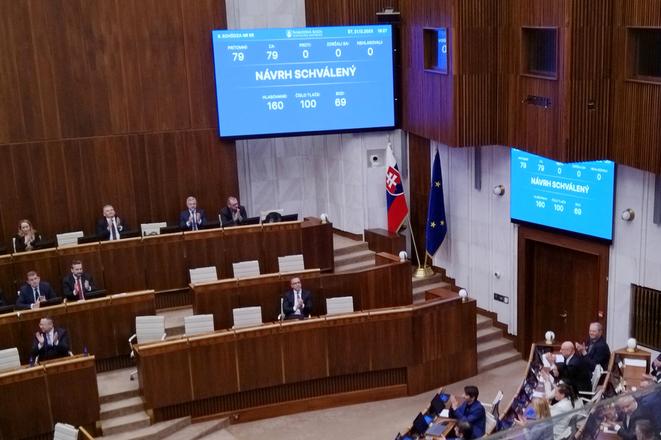Almost half of Slovaks think that the current government will influence police investigations and trials related to corruption cases. This opinion is held by even a fifth of the voters of the government coalition parties (Smer - Hlas - SNS), according to the NMS Market Research Slovakia survey.
Only a quarter of Slovaks think the opposite.
Several people with links to the previous Smer-led governments were sent to prison for corruption and other crimes, including ex-special prosecutor Dušan Kovačik. Others, like Smer MP and ex-police chief Tibor Gašpar, face criminal charges related to running an organised crime group or the abuse of power.
However, the survey does not show that the voters of the coalition parties would not agree with the bullying of some police officers, or that they would oppose the government’s intention to abolish the Special Prosecutor’s Office or reduce the penalty rates for corruption.
Almost half of the population also thinks that the government will raise taxes. There is also a prevailing opinion in society that the government will get Slovakia even more into debt. Forty percent of Slovaks think so. Among all the voters of the coalition parties, the voters of Hlas are the least convinced of the government’s ability to consolidate public finances.
The data collection took place from November 30 to December 3, that is, during the period when the abolition of the anti-corruption Special Prosecutor’s Office, which is postponed to 2024, was already discussed, and at the same time before the introduction of the consolidation measures that the parliament approved this week.
Polarised society
Only about a third of the population believes that the government will calm the atmosphere in society, fulfil its pre-election promises, help people, or consolidate public finances.
"The government has not yet been able to fully gain the trust of the people," Denisa Lakatošová from the NMS Market Research Slovakia agency said.
Up to 86 percent of Smer voters expect the government to fulfil its promises. However, it is only 59 percent among Hlas voters and only 54 percent among SNS voters. A similar contradiction can be seen when it comes to the consolidation of public finances.
The new government divides the population into thirds - those who are satisfied (36 percent), those who are dissatisfied (35 percent) and those who are somewhere in the middle (29 percent). When looking at the degree of satisfaction or dissatisfaction among the voters of individual parties, the division into opposition and coalition blocs can be seen again. While up to 92 percent of Smer voters are satisfied with the new government’s performance and steps to date, it is the case for 81 percent of SNS voters and 71 percent of Hlas voters. In the opposition camp, there is considerable dissatisfaction with the performance and steps taken by the government. Up to 85 percent of SaS voters, 84 percent of PS voters and 67 percent of OĽaNO (Slovensko) voters are very or rather dissatisfied.
"The result only confirms that Slovak society is still very polarised," added Lakatošová.
In the December survey by the Ipsos agency, the Smer party remained the most popular party. In December, 24.1 percent of voters would vote for Smer, followed by PS with 19.4 percent. The far-right party Republika, which has no MPs in the house after the September 2023 election, would also get into parliament. OĽaNO (if it ran as a coalition party) and SNS would end up outside the parliament.



 MPs approved the state budget bill on December 21, 2023. (source: TASR)
MPs approved the state budget bill on December 21, 2023. (source: TASR)